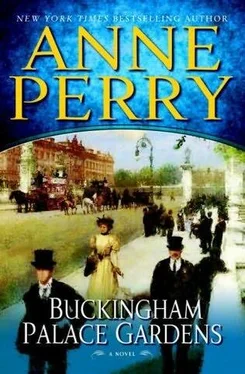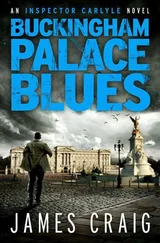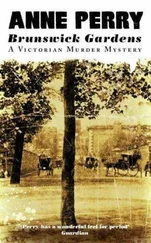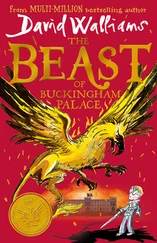Anne Perry - Buckingham Palace Gardens
Здесь есть возможность читать онлайн «Anne Perry - Buckingham Palace Gardens» весь текст электронной книги совершенно бесплатно (целиком полную версию без сокращений). В некоторых случаях можно слушать аудио, скачать через торрент в формате fb2 и присутствует краткое содержание. Жанр: Исторический детектив, на английском языке. Описание произведения, (предисловие) а так же отзывы посетителей доступны на портале библиотеки ЛибКат.
- Название:Buckingham Palace Gardens
- Автор:
- Жанр:
- Год:неизвестен
- ISBN:нет данных
- Рейтинг книги:4 / 5. Голосов: 1
-
Избранное:Добавить в избранное
- Отзывы:
-
Ваша оценка:
- 80
- 1
- 2
- 3
- 4
- 5
Buckingham Palace Gardens: краткое содержание, описание и аннотация
Предлагаем к чтению аннотацию, описание, краткое содержание или предисловие (зависит от того, что написал сам автор книги «Buckingham Palace Gardens»). Если вы не нашли необходимую информацию о книге — напишите в комментариях, мы постараемся отыскать её.
Buckingham Palace Gardens — читать онлайн бесплатно полную книгу (весь текст) целиком
Ниже представлен текст книги, разбитый по страницам. Система сохранения места последней прочитанной страницы, позволяет с удобством читать онлайн бесплатно книгу «Buckingham Palace Gardens», без необходимости каждый раз заново искать на чём Вы остановились. Поставьте закладку, и сможете в любой момент перейти на страницу, на которой закончили чтение.
Интервал:
Закладка:
Minnie was in her late twenties, tall and slender, yet with a volup-tuous grace. She was not conventionally beautiful; instead, she had an air of daring and glamour about her that was more exciting than mere regularity of features or flawlessness of complexion. It suggested passion and originality, a challenge to master. There was something unsatisfied in her that gave her a restlessness many men found attractive. Eight years ago she had married Julius Sorokine. This fact was so painful to Elsa that she couldn’t bear to dwell on it, and yet neither could she fully leave it alone. Minnie and Julius’s wedding had happened just before Elsa had married Cahoon, although Elsa was ten years Minnie’s senior. Family obligations had delayed the point where Elsa was able to marry, which in fact had not been a hardship because there had been no one she truly loved. But then she met Julius, and of course that was far too late. By then he was her son-in-law, and there was no hope at all for any other relationship between them, just a dream that there could have been something infinitely, passionately better than this! Her life could have had laughter in it, kindness, the sharing of joy and pain, the trust and the inner gentleness that is love.
But Minnie had not found it in Julius, or she would never have indulged in that brief, white-hot affair with Julius’s half-brother, Simnel Marquand.
“What is it, Bartie?” Elsa said more abruptly. “Stop fussing with the things on the dressing table and tell me.” She took a second sip of her tea, steadying herself.
Bartle put down the tortoiseshell-backed hairbrush. “The gentlemen had a. . a party last night,” she said stiffly. “It seems one of the trollops they had in got herself killed. . in the linen cupboard of all places.” She sniffed. In spite of her words, her face was crumpled with pity. “I can’t imagine what the stupid creature was doing there. Although I suppose they have to do whatever they’re paid for, poor things.”
“Killed?” Elsa was incredulous. The cup nearly slipped out of her hand. “What kind of an accident can you have in a linen cupboard, for goodness’ sake? You must be mistaken.”
“It wasn’t an accident, Miss Elsa,” Bartle explained miserably.
“They’ve got the police in. That’s why everyone’s having breakfast in bed. The Prince has asked everyone to stay in their rooms until it’s been seen to.”
“That’s absurd.” Elsa struggled to grasp the meaning of what Bartle had said. “No one here would kill anybody, and surely the Palace, of all places, cannot be broken into?”
“No, miss. That’s what’s so bad about it,” Bartle agreed, waiting for Elsa to understand.
“It must have been an accident.” Elsa’s mind raced to think what could have happened. She had gone to bed early, as had the other three women, to avoid the appearance of even knowing about the party. “That’s the only thing possible. It’s ridiculous to get the police in.”
“Shall I lay out the green and white muslin, Miss Elsa?” Bartle asked.
“If the woman is dead, I should wear something darker,” Elsa replied.
“She was a street woman, miss. And you’re not supposed to even know about her,” Bartle pointed out.
“She’s still dead,” Elsa retorted.
Bartle did not reply, but went on laying out the expensive morning gown of printed linen and muslin. It had a deep collar heavily frilled with lace and ribbons, and more lace down the front and at the sleeves. A wide, dark green ribbon tied around the waist and fell on the first tier of the skirt. The middle tier was plain green linen, the third heavily gathered muslin again. Cahoon was generous, and of course he expected his wife to look both beautiful and expensive. It was a reflection upon him. He had married Elsa because she knew how to conduct herself, to say the right things, and use the correct form of address for everyone. She was an excellent hostess. Her dinner parties never failed. She had a gift for knowing exactly who to invite with whom. And she never complained. That was part of the bargain between them.
“Bargain” was a terrible word to describe a marriage, and yet, tac-itly, that is what it had been, in spite of the turbulent physical beginning. And that was past now. Emotionally she bored him, which both hurt, because it was humiliating, and was a kind of relief, because she no longer desired him either. He was intelligent, commanding to look at, and he certainly afforded her a life of luxury, travel, and conversation with most interesting people-men who invented, explored, dared, and governed all over the Empire.
Elsa knew she was envied. She had seen the quick fire of interest in other women’s eyes, the flush to the skin, heard the altered pitch in their voices. She had enjoyed it. Who does not wish to have what others so clearly want?
But at the end of even the most vigorous or luxurious day, even if briefly physically intimate, at heart she was alone. She and Cahoon did not share laughter or dreams. She did not know what hurt him or moved him to tenderness, nor did he appear to know it of her. What twisted the knife in the wound was the fact that he did not wish to.
Would life with Julius have been any different? It was a sudden, bitter thought that if he did not love Minnie, maybe then perhaps he was not capable of loving anyone.
It was a long, frustrating morning alone. She did not go to the withdrawing room for the guests’ use until shortly before luncheon.
The walls were lined in vivid yellow brocade exactly matching that of the sofas and the seats of the elegant, hard-backed chairs. The enormous windows, stretching almost to the height of the ornate blue-and-white ceiling, were curtained in the same shade. The mantel was also white, with tall blue lamps on either end of it, giving the whole room a delicate, sunny feeling. The carpet was pale blue and russet.
The only darker tones were the surfaces of the tables in the center and against the wall, where one might rest a glass.
Elsa found only Olga Marquand there, wearing a plum gown that did not flatter her dark looks. It should have been warming to her sallow complexion, and yet somehow it failed. Nor did its severe line lend her any suggestion of softness. A gathering, a drape, an additional tier of skirt might have helped.
Olga was a little above average height and very slender. With more confidence she would have been elegant, but looking at her now, Elsa realized how little Olga had the spirit to fight. She did not brazen it out and make people believe that her square shoulders and angular grace were more interesting than the more traditional curves of someone like Minnie. She had high cheekbones and a slightly aquiline nose. Her brow was smooth and her black hair swept back from it with unusual classic severity. Her dark eyes were hooded. At their first meeting Elsa had thought Olga uniquely beautiful. Now she seemed beaky, and cold.
Olga turned as Elsa entered the room. “Have you heard anything more?” she asked quietly. Her voice was good, even rich. “Who is it who died? Why is everyone being so secretive?”
“My maid said it was one of the. . the women from last night’s party,” Elsa replied, keeping her own voice low as well.
Olga raised her arched eyebrows. “What did she do, fall downstairs blind drunk?” Her voice was raw with disgust, though perhaps it was pain. Elsa could only guess how she felt about her husband associating with such women, even if it was only to please the Prince of Wales. Perhaps he thought he had no choice, if they were to ensure the Prince’s support in their bid to gain the contract for a railway right from Cape Town to Cairo, like a spine to all Africa. Did Olga understand that, or did it hurt too much for her to care?
Elsa looked at her and thought how different they were. She realized with surprise that she was not repulsed by the thought that Cahoon should have indulged himself with either the brandy or the women. She would have, in the beginning, but not now. Olga cared to the point where she could not keep from betraying the pain of it, even in front of others. It was more than self-possession or dignity, or a trespass on her pride. She still loved Simnel, in spite of everything.
Читать дальшеИнтервал:
Закладка:
Похожие книги на «Buckingham Palace Gardens»
Представляем Вашему вниманию похожие книги на «Buckingham Palace Gardens» списком для выбора. Мы отобрали схожую по названию и смыслу литературу в надежде предоставить читателям больше вариантов отыскать новые, интересные, ещё непрочитанные произведения.
Обсуждение, отзывы о книге «Buckingham Palace Gardens» и просто собственные мнения читателей. Оставьте ваши комментарии, напишите, что Вы думаете о произведении, его смысле или главных героях. Укажите что конкретно понравилось, а что нет, и почему Вы так считаете.












